Business & Management
Academicians Retooled on the System of Environmental-Economic Accounting (SEEA)
Published
4 years agoon
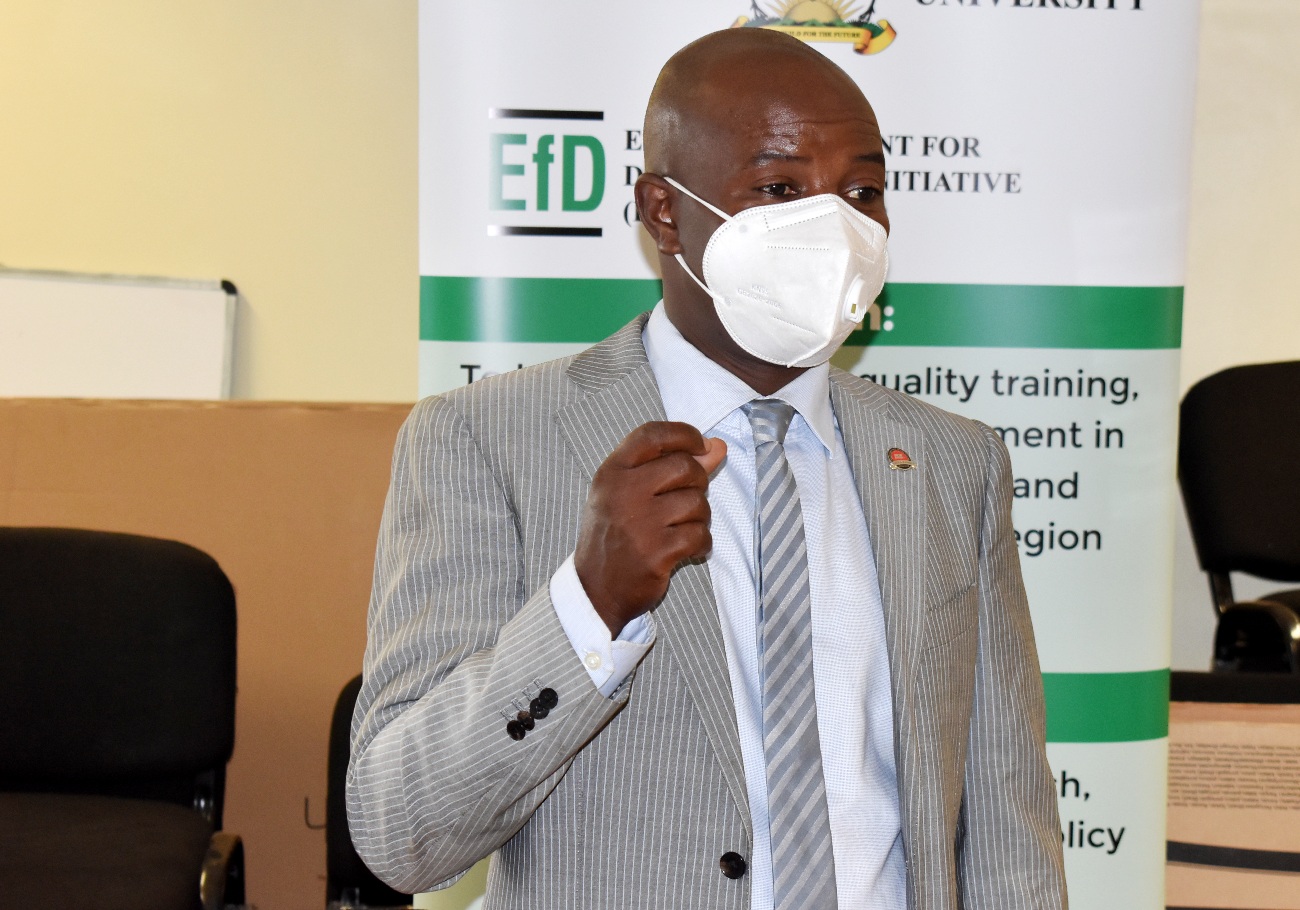
By Jane Anyango
Over 30 members of the academia comprising staff and graduate students from Makerere University School of Economics, Muni University and Makerere University Business School on 28th September, 2021 converged for a training on the System of Environmental-Economic Accounting (SEEA).
The blended seminar held physically and virtually was organized by the Environment for Development Initiative (EfD-Mak) Centre facilitated by the Makerere University don, who is also Research Fellow at the EfD-Mak center and Fulbright Scholar Dr. Nickolas Kilimani.
Dr. Kilimani streamed live from the USA on the System of Environmental-Economic Accounting focusing on the Integrated Water Resources Management, Policy Analysis and Decision making.
Dr. Kilimani highlighted the recent developments in Environmental-Economic Accounting in Uganda, the System of Environmental-Economic Accounting and its objectives, Water resources accounting modules and the role of Water Accounting in Integrated Water Resources Management (IWRM).
Dr. Kilimani observed that the national economic policy has been underpinned by macroeconomic theory and the necessary statistics are collected and arranged using the System of National Accounts (SNA) which covers all economic activity from production to consumption and accumulation, and all industries using the Gross Domestic Product (GDP) as the key indicator.
He noted that the basic theoretical foundation of the SNA has not changed since 1953 even with the detail that has evolved with technological, economic and social change adding that, for more than 70 years, governments and business have used the information from the SNA as an information source in economic analysis and policy.
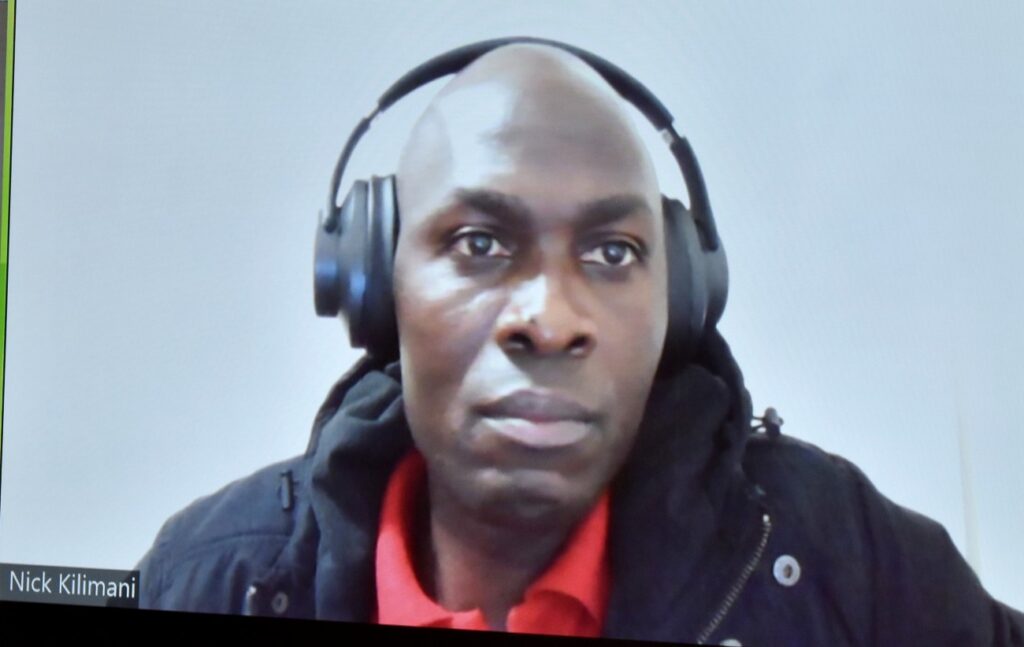
“The SNA does not adequately account for the environment and yet economic activity can adversely drive both observed and unobserved changes in it. The System of Environmental-Economic Accounting (SEEA) aims to address the deficiency of the traditional national accounting (the SNA) by accounting for the environment and linking it to environmental information through common concepts, definitions and classifications” Dr. Kilimani stated.
Compared to the SNA, Kilimani said, the SEEA is not yet widely used in decision making, partly because, it has recently been adopted as an international standard.
Dr. Kilimani said the objectives of SEEA are to develop a consistent data system for economic and environmental data and provide a common system to derive indicators and measure sustainable development.
He explained that the SEEA provides a better measure of national wealth to include not only produced capital but also natural capital, and assesses availability of natural resources, their use in production and final consumption and the cost of depletion. In addition Kilimani said, SEEA assess the level and cost of emissions and other waste from production and consumption and identifies monetary flows related to the environment which are already within the SNA (e.g., expenditures on environmental protection, environmental taxes and subsidies,etc.)
Dr. Kilimani underscored the role of Water Accounting in Integrated Water Resource Management (IWRM) noting that the growing pressure on water resources and high uncertainty on future water availability have caused the urgent need for better planning and management.
He emphasized that water is not only essential to cover basic needs for humans and the environment that underpins them, it is also a key factor for the economic development of diverse sectors with conflicting interests as regard to its use.
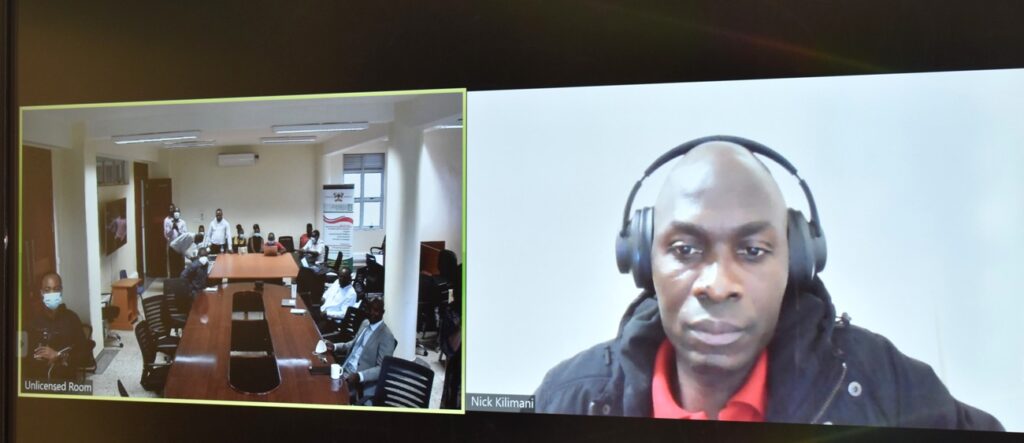
“The IWRM paradigm is considered a good approach to deal with those complexities. It proposes a coordinated utilization of water and land resources to support economic and social development without compromising environmental sustainability.
It recognizes that water management is a key aspect since human intervention is the trigger for all trade-offs and conflicts around water. IWRM highlights the influence of catchment management on water resources quantity and quality, as well as the need to preserve the natural capital for future generations.” He added.
Dr. Kilimani said Water management is considered a social, economic, and political issue rather than just technical and therefore, stakeholder involvement in water management is needed and this translates into legal requirements for public participation and transparency in water governance.
“The value of water, the opportunity costs of its allocation, or the costs of making it available should be known and recognized in order to incentivize water use efficiency. The implementation of those legal requirements calls for making information about water publicly available in a clear and accessible way. In this sense, water accounting emerges as a useful tool to promote efficiency and transparency in water resource planning and management”, Kilimani stated.
The current and proposed framework for IWRM in Uganda
Dr. Kilimani said the existing institutional and policy framework shows the multiple institutions charged with the management of water resources in Uganda, but, there is a need for an explicit connection between water sector policies and those of the social-economic sectors, since water resources are a key input into the country’s economic and social sectors.
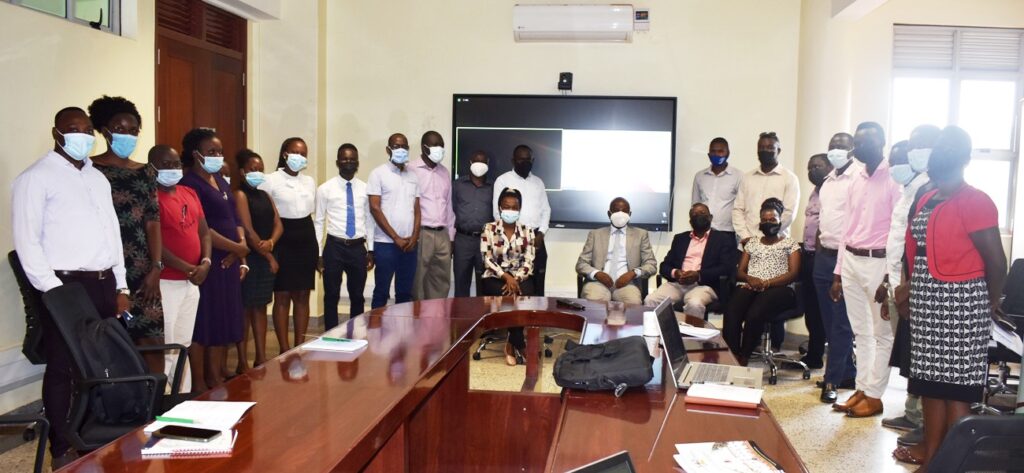
“The institutional framework in Uganda, provides for a key component such as Water for Production. Institutions in charge of managing the productive sectors of the economy, i.e., MoFPED, (MAAIF), and the MTTI need to link their development plans and policies with those of the water sector. A sound national water policy should relate the different development plans of the social-economic sectors in an explicit manner”. Kilimani said.
In the (2015) paper, Dr. Kilimani and other researchers proposed a framework for policy analysis which relates the development plans for the different social-economic sectors to those of the water sector.
This framework he said is aimed at providing policy analysis of IWRM in a typical economy by linking e.g., agriculture, industry, households, hydro-electricity and navigation which are key sectors that primarily depend on water.
The don explained that development plans in these sectors involve several policy variables and inputs. Therefore, the interaction between the policy variables and their impacts are monitored through multiple indicators in the social-economic and ecological domains.
“Given the multiplicity of variables, the SEEA framework uses aggregated water data as do the existing approaches for analyzing the associated policy impacts.
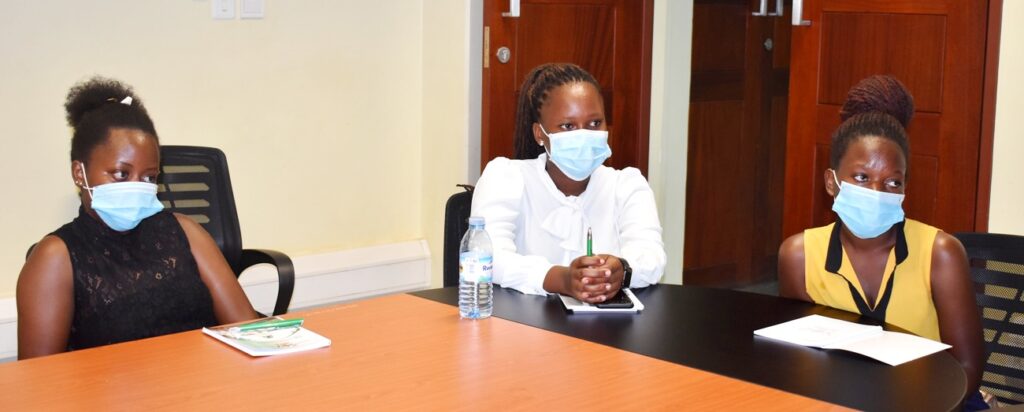
Computable general equilibrium (CGE) models also use aggregation and hierarchical decomposition in order to simplify model development and data compression to manageable sizes.
While the aggregation hides some of the temporal and spatial variability, it still preserves the fundamental trends that help to provide needed answers by policy-makers”, Kilimani said.
SEEA, a new area of interest to academicians and the Government of Government
The Director EfD-Mak Center Prof. Edward Bbaale described the seminar as the most exciting because it brought on board a new area which is of interest to the Government of Uganda.
Prof. Bbaale said, Uganda Bureau of Statistics, the National Planning Authority and other partners are trying to work on the system of Environmental-Economic Accounting away from the conventional system of National Accounting.
“Our System of National Accounting is deficient in incorporating Environmental aspects because as we produce and consume, then in one way or another, we are depleting the environment which we refer to as natural capital and this natural capital is all the time depreciating but there is no way in our conventional GDP measurements that, but now, this new system is solution to this”, Prof. Bbaale stated.
From the academic perspective, Prof. Bbaale commended the facilitator for showing participants how to undertake the System of Environmental-Economic Accounting and ably bringing participants on board in terms of the key variables that are important in this new system specific to the water sector.
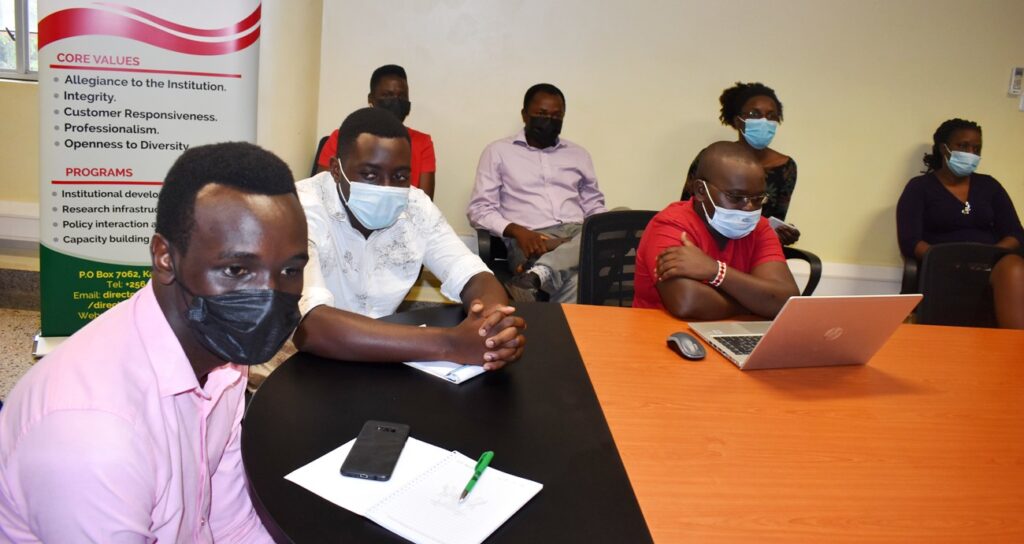
The Director appreciated Dr. Kilimani for exposing participants to the policy, non-policy and the output variables and giving tips on some methods such as the Computable general equilibrium (CGE) which can be utilized to understand the impact of a policy decision on the rest of the economy in terms of the social, economic and environmental outcome.
“The lesson here is that we need to invest our time into understanding this new System of Environmental-Economic Accounting as a way of incorporating new ventures in our research as economists and academicians. And to our graduate students, this is an area worthy of investing their time and I am glad that a number of graduate students attended this seminar”, Prof. Edward Bbaale said.
Prof. Bbaale said, a number of reports are already out and that SEEA is an area which is very virgin, where very limited research has been undertaken partly because of lack of numbers that incorporate the environment into the entire national analysis.
“But now, some strides have been taken, some milestones are being achieved and if our own, Dr. Nickolas Kilimani with a Fulbright Scholar in the US is having all these on his fingertips, it is a huge resource to Makerere University, to our country and it is a starting point of deeper analysis into how the environment is being affected when we are doing our production and consumption activities”, Prof. Bbaale said.
He reported that the seminar was quite intriguing and important for national policy and pledged to arrange to involve policy makers from the Ministry of Water and Environment and the National Water and Sewerage Corporation in the next seminar.
Participants comment on the seminar
Makerere University PhD student from the School of Economics Alex Aliga, who is also a lecturer at Muni University Uganda said the seminar was timely.
“It has enriched many of the things that I had learnt in class and I had taken for granted. The System of Environment and Economic Analysis though new is very important and interesting because once you begin to understand Natural Resource Accounting and integrate it into GDP, then we get to understand the full value of our resources. In that case, it means that we may actually be richer than what we thought we are. Some of these things are not easy to bring to the GDP which is the measure of our national economy.
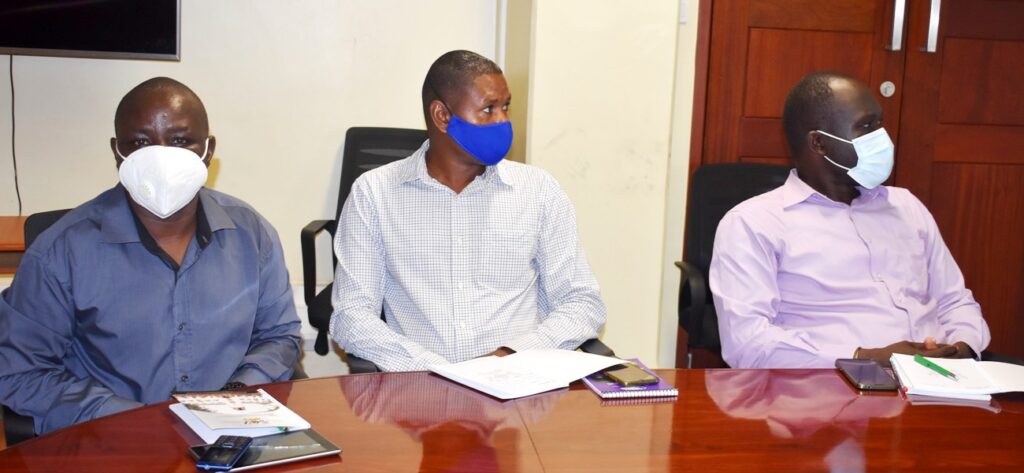
I got many lessons; – understanding how you can apply the theoretical things into practical and to influence policy is very important for our country. Given the fact that our resources are under attack, climatic change and environmental issues are real, we need this knowledge so as to be able to sustainably use our resources for a better future”, Mr. Aliga said.
Dr. Paul Edabu, a Senior Lecturer at Muni University said:
“The day’s seminar was an eye opener to the current situation in Uganda bearing in mind that we have two blocks of people who are in accounts and economics and there is no integration even in our ministries.
Our country is at a paradox, today people are restricted to cut trees from the forests and also carrying out farming in the wetlands and the next day, a factory is erected in the wetland. This seminar is timely and something I had yearned to learn because it incorporates the environment as a key resource into the national accounting system”, Dr. Edabu commented.
SEEA and the Government of Uganda
Government of Uganda (GoU) is moving towards resource-led industrialization by developing a set of natural capital accounts under the Uganda Natural Capital Accounting (NCA) program. The National Biodiversity Strategy and Action Plan (NBSAP), National Development Plan, and Uganda Green Growth Development Strategy (UGGDS) recognize the challenges of development planning without accounting for its effect on natural resources, many of which are non-renewable.
In cognizance of the above, GoU with her development partner UNEP with its World Conservation Monitoring Centre arm is working with the Darwin Initiative to develop Natural Capital Accounts for Uganda.
The project is aligned with existing initiatives on natural capital accounting, i.e., the Gaborone Declaration for Sustainable Development in Africa, the UN project on Natural Capital Accounting, and the World Bank Wealth Accounting and the Valuation of Ecosystem Services programme.
The Uganda Bureau of Statistics (UBOS) Ministry of Water and Environment, and Ministry of Lands, Housing and Urban Development commenced with the development of land accounts and Water accounts in 2019. Under the NCA program, the country launched the Wood Asset and Forest Resources Accounts.
Natural Capital Accounting effort is based on the international statistical standard, System of Environmental-Economic Accounting (SEEA).
Jane Anyango is the Principal Communication Officer, College of Agricultural and Environmental Sciences (CAES)
You may like
-


Call for Applications: Diploma Holders under Government Sponsorship 2026/2027
-
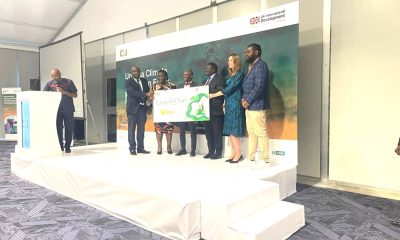

Makerere University Researchers Awarded UCIF Grant to Tackle Maize Contamination with Innovative Plant-Based Fungicide
-


Makerere Graduation Underscores Investment in Africa’s Public Health Capacity
-
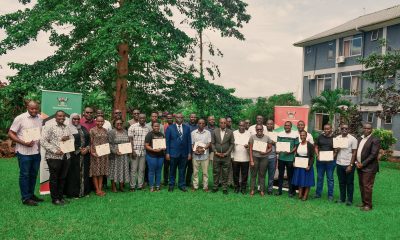

Thirty Public Officers Certified in Integrated Regulatory Cost-Benefit Analysis
-


Botswana Delegation Visits Makerere’s Public Investment Management Centre to Study Sustainable Training Model
-


Makerere University commemorates 13 transformative years of partnership with Mastercard Foundation
Business & Management
Thirty Public Officers Certified in Integrated Regulatory Cost-Benefit Analysis
Published
2 days agoon
March 3, 2026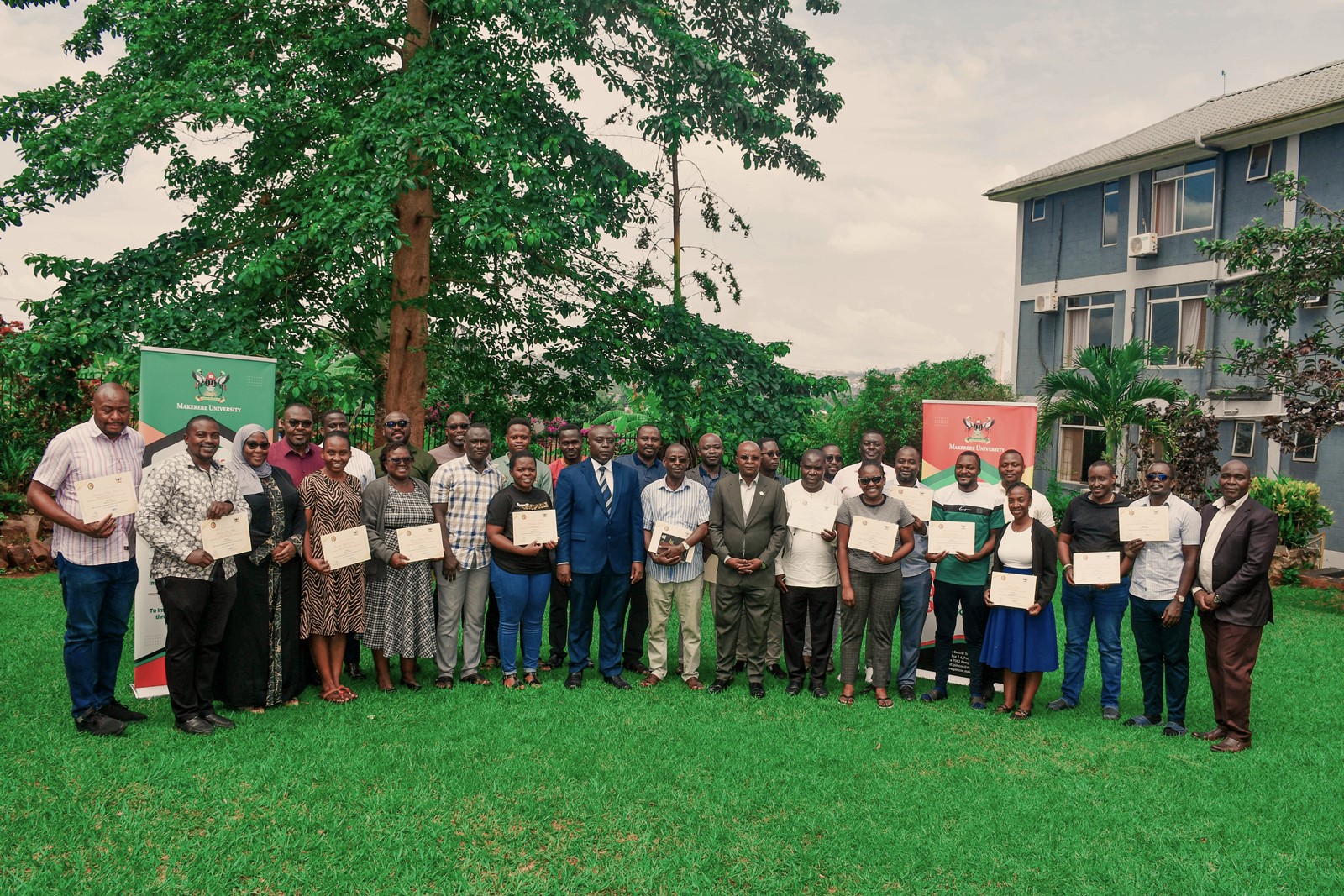
Thirty public officers from various Ministries, Departments and Agencies (MDAs) have successfully completed a two-week intensive training in Integrated Regulatory Cost-Benefit Analysis (IRCBA), culminating in the award of certificates at a closing ceremony held on 27th February 2026 at the Pearl on the Nile Hotel in Jinja.
The training was jointly organized by the Public Investment Management Centre of Excellence at Makerere University and the Ministry of Finance, Planning and Economic Development (MoFPED), in collaboration with the Infrastructure and Social Services Department (ISSD) and the National Planning Authority (NPA). It focused on operationalizing the Revised Guidelines for the Issuance of Certificates of Financial Implication (CFIs), which came into effect on 1st July 2025.
A Strategic Reform for Fiscal Credibility
In closing remarks delivered on by Commissioner Paul Patrick Mwanja behalf of the Permanent Secretary/Secretary to the Treasury, participants were commended for undertaking the training during a demanding budget cycle, when many MDAs are simultaneously preparing the FY 2026/27 Budget, executing the FY 2025/26 Budget, and implementing the National Development Plan IV and the Tenfold Growth Strategy.
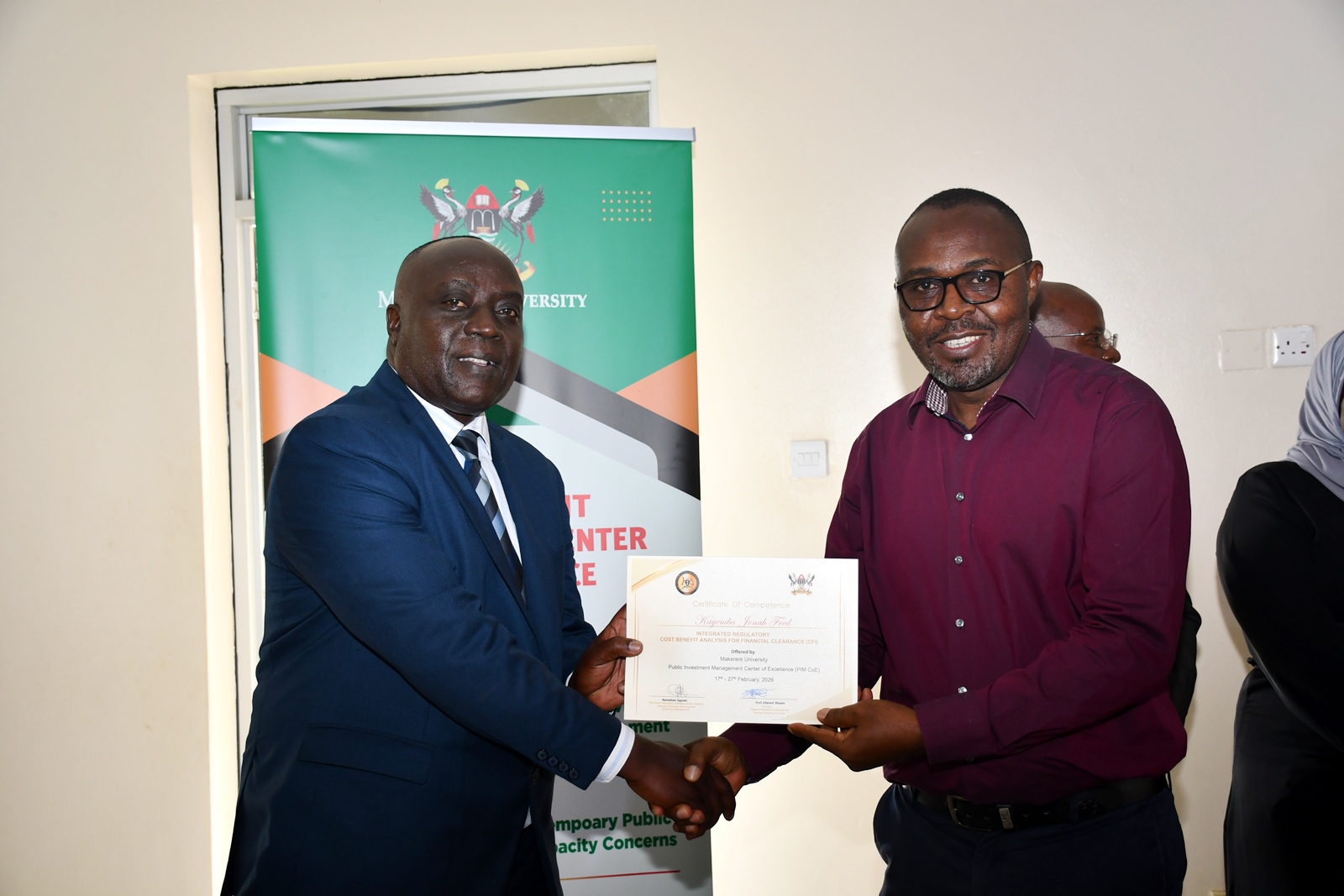
The PS/ST emphasized that the revised Guidelines mark a significant shift toward a more transparent, data-driven, consultative, and analytically rigorous approach to evaluating policy and legislative proposals. Participants were equipped to assess fiscal implications, evaluate economic and socio-economic impacts, analyze distributional effects, and address uncertainty using structured analytical tools.
They were reminded that training alone is not sufficient, the real test lies in consistent application. As members of the third cohort, they were challenged to serve as reform ambassadors, championing evidence-based policymaking and strengthening analytical standards across government.
Bridging Academia and Public Service
Delivering the official closing remarks, the Director of the PIM Centre of Excellence, Prof. Edward Bbaale, commended participants for their active engagement and unwavering commitment throughout the training.
He described the programme as both timely and strategic, designed to equip officers with practical tools to prepare robust Statements of Financial Implication (SFIs) that support credible issuance of CFIs. He noted that strong financial analysis enhances fiscal discipline, policy coherence, and the overall quality of legislation and public policy in Uganda.
Prof. Bbaale underscored the longstanding partnership between Makerere University and the Ministry of Finance, highlighting how it continues to bridge academia and public service by combining analytical rigor with practical policy experience. He emphasized that the collaborative model — bringing together faculty from the College of Business and Management Sciences and practitioners from Government, reflects the core vision of the PIM Centre of Excellence: strengthening national systems through evidence-based policymaking.
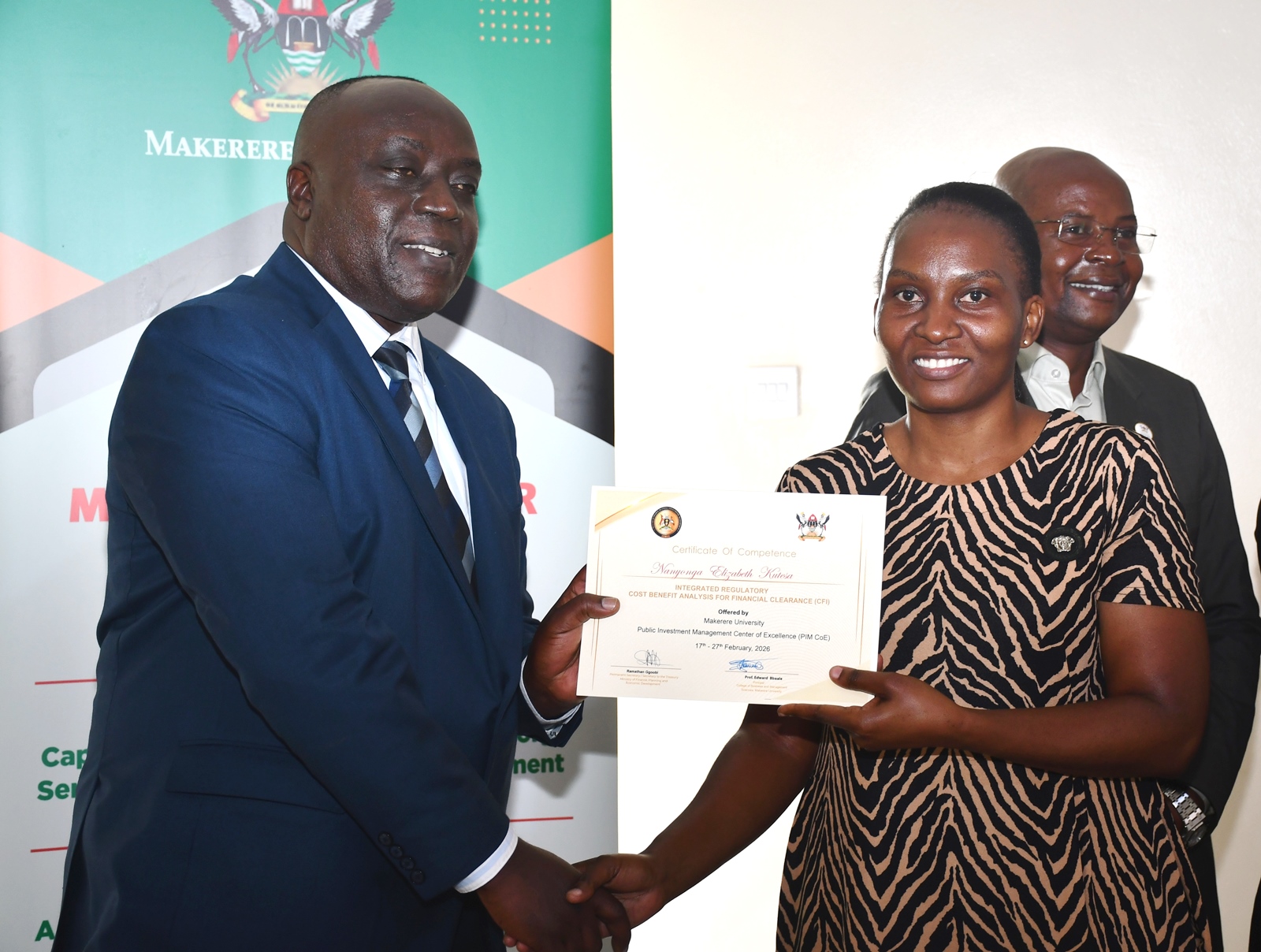
During the two weeks, participants gained hands-on experience in applying cost-benefit analysis across four critical dimensions: budgetary analysis, socio-economic analysis, distributive impacts, and risk assessment. Prof. Bbaale encouraged them to return to their institutions as agents of transformation, improving evaluation frameworks, strengthening regulatory decisions, and ensuring that public interventions deliver value for money and long-term development impact.
He also reaffirmed the Centre’s broader mandate beyond training, noting its recent support to the revision of Development Committee Guidelines, assessment of public investment performance since NDP I, and hosting of the Second Public Investment Management Conference in August 2025.”
Building from “Zero Kilometre”
Earlier, the Manager of the PIM Centre of Excellence highlighted the practical approach adopted during the training. Participants began with blank Excel sheets and built analytical models from scratch, likened to the engineering concept of starting at “zero kilometre,” where construction begins from the very starting point and progresses step by step.
The interactive sessions enabled participants from diverse disciplines, including policy analysts, planners and statisticians, to interrogate assumptions, refine costing approaches, and debate implementation and enforcement frameworks. Their sector-specific insights enriched the learning process and strengthened the analytical models developed.
The Manager noted that excellence is not about knowing everything, but about bringing together the right expertise. Facilitators from MoFPED, NPA, the Office of the President, and Makerere University ensured that theory remained grounded in practical government realities.
Participants Applaud Practical and Engaging Sessions
Speaking on behalf of the cohort, a participant described the training as highly engaging and transformative. The combination of theory and practical application, coupled with patient facilitation, allowed officers from varied professional backgrounds to learn from one another.
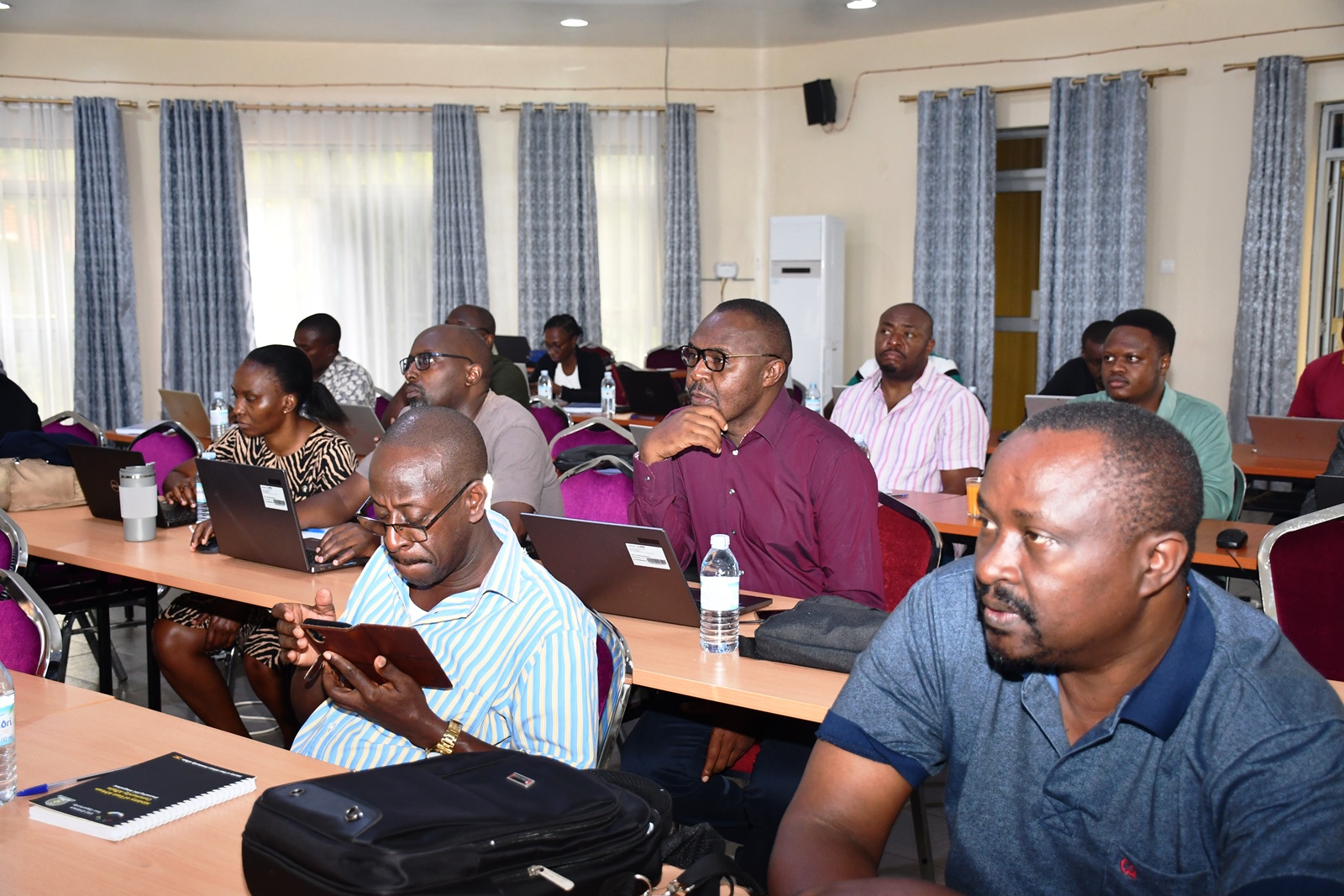
The participant highlighted the final day’s discussions as the most impactful, expressing confidence that the knowledge gained would enhance policy analysis and improve the quality of programmes and projects across MDAs.
Certificates Awarded
The ceremony concluded with the award of certificates to all 30 participants in recognition of their successful completion of the IRCBA training. The certification marks another milestone in Government’s effort to build a critical mass of experts capable of institutionalizing rigorous financial and economic analysis in public policy processes.
As the workshop was formally declared closed, participants were encouraged to apply their newly acquired skills consistently, mentor colleagues, and contribute to strengthening fiscal governance across Government.
The PIM Centre of Excellence reaffirmed its commitment to continuous research, policy advisory support, and capacity building as Uganda advances toward more credible, transparent, and sustainable public decision-making.
Business & Management
Botswana Delegation Visits Makerere’s Public Investment Management Centre to Study Sustainable Training Model
Published
2 days agoon
March 3, 2026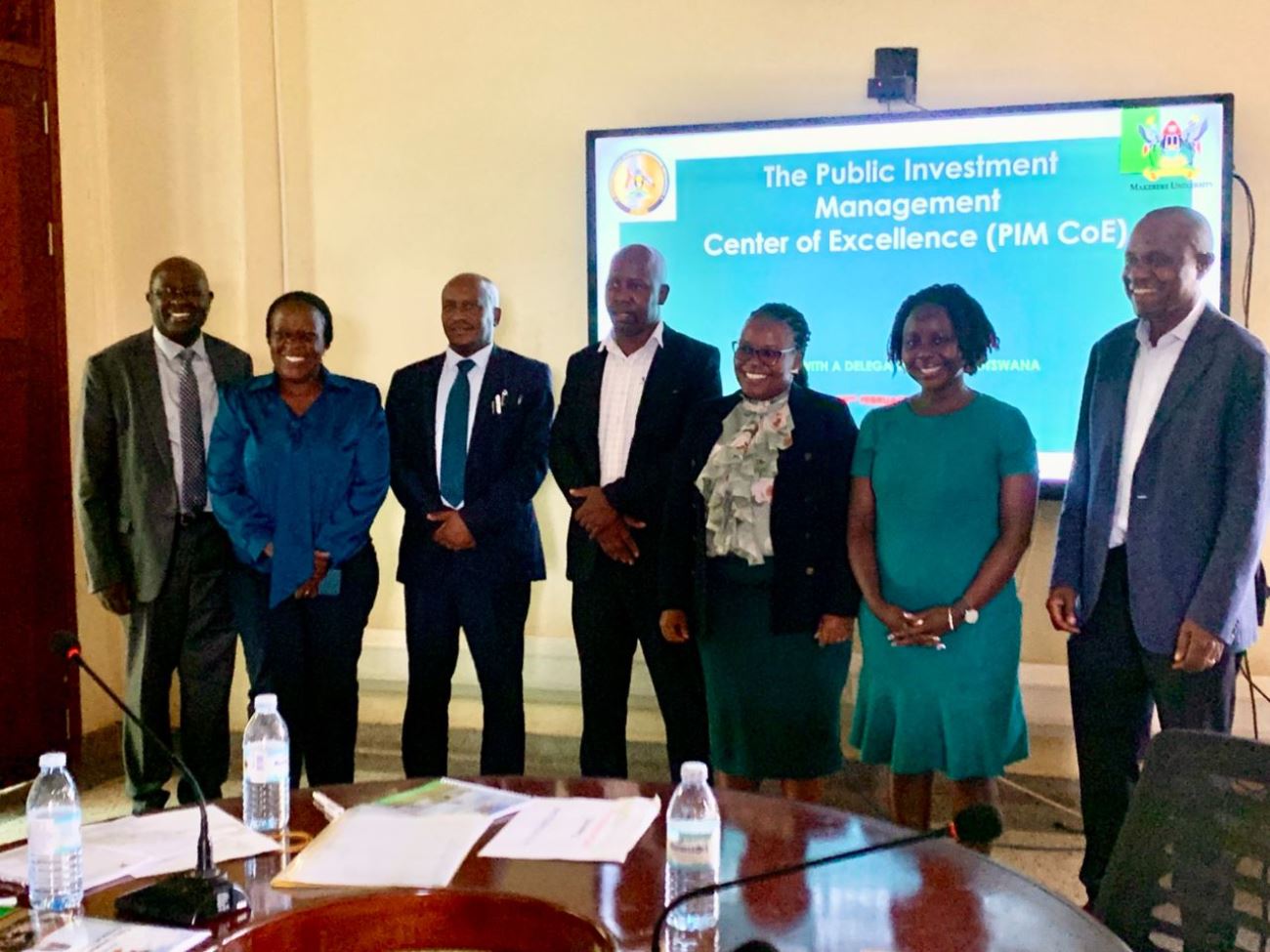
Kampala, Uganda – 25 February 2026
A delegation from Botswana’s public investments sector on 25th February 2026 visited Makerere University’s Public Investment Management Centre of Excellence to benchmark its sustainable training model and draw lessons from Uganda’s well-established Public Investment Management (PIM) framework.
The team, composed of specialists in public investments, is exploring ways to strengthen capacity within Botswana’s public sector institutions. The delegation underscored the importance of structured and sustainable capacity-building programmes, noting that effective public investment management is central to driving national development and ensuring value for money in public projects.
During the engagement, the Botswana team sought to understand the Centre’s operational model, including how it designs and delivers training programmes that remain impactful over time. Particular interest was placed on the Centre’s approach to sustainable training delivery, the documentation of challenges and successes, and mechanisms used to ensure that public officers acquire long-term, practical skills that translate into improved project planning, appraisal, and implementation.
The visiting delegation commended Uganda’s commitment to institutionalizing PIM training and emphasized that cross-country learning is vital for strengthening public financial management systems across Africa. They observed that Uganda’s experience offers practical insights into building a resilient and responsive PIM framework anchored in continuous professional development.
As part of their recommendations, the delegation proposed the introduction of a hybrid training model to enhance accessibility for international participants. Under this approach, the theoretical components of PIM courses would be delivered online, allowing participants to engage remotely from Botswana and other countries. This would then be followed by in-person sessions in Uganda focused on hands-on, experiential learning at the Centre.
According to the delegation, such a model would significantly reduce travel costs and time while preserving the value of face-to-face practical training. The hybrid approach would also provide flexibility for busy public officers, enabling them to balance professional responsibilities with structured learning.
The visit further strengthened regional collaboration and reaffirmed the role of Uganda’s Public Investment Management Centre of Excellence as a hub for capacity development in public investment management across the continent.
Business & Management
76th Graduation Ceremony: CoBAMS Staff and Graduates Win Excellence Awards
Published
1 week agoon
February 26, 2026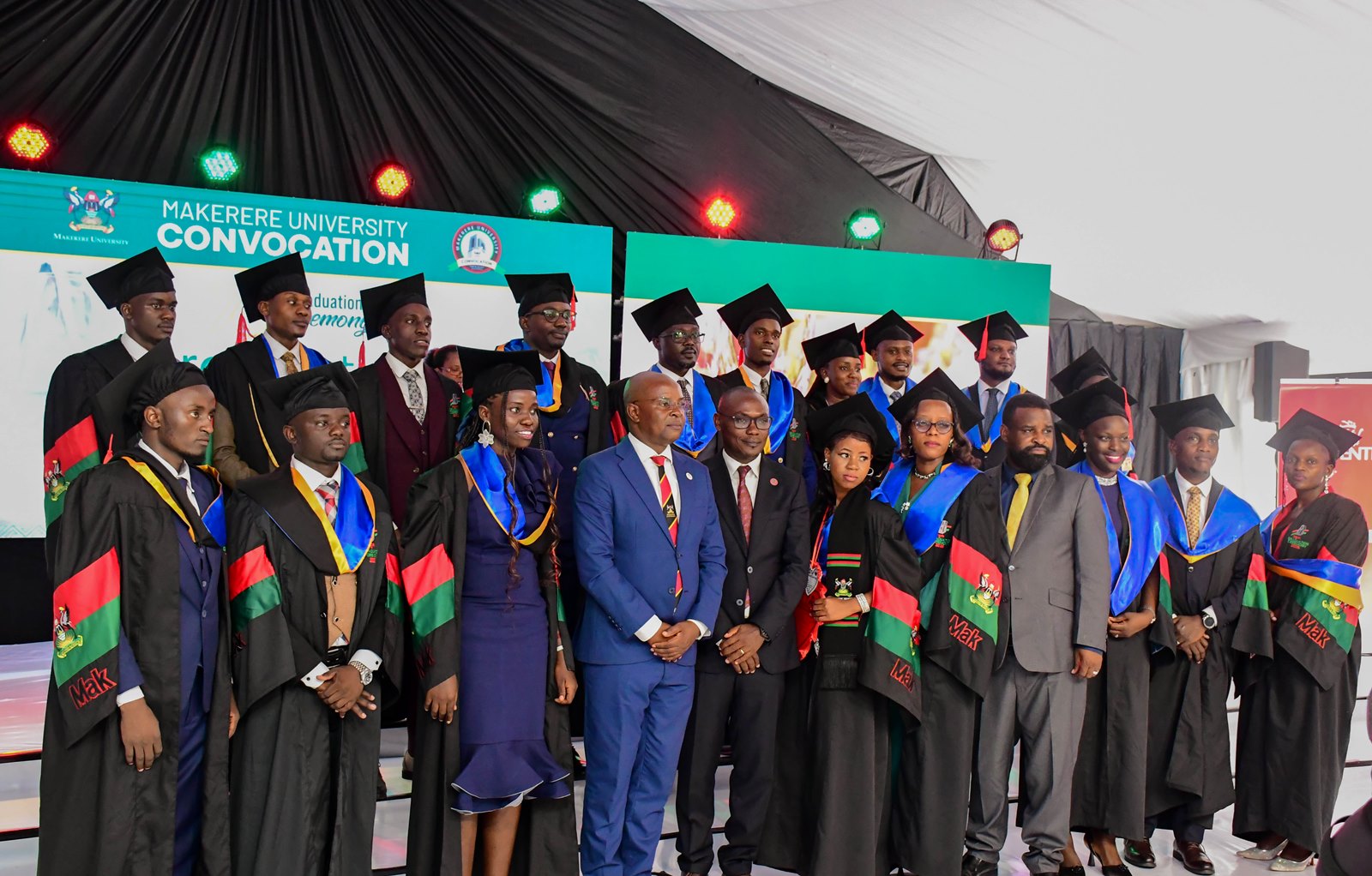
26th February 2026-During the 76th Graduation Ceremony (24th to 27th February 2026), Makerere University invoked its tradition of recognizing outstanding performance and excellence in academics, research, teaching, knowledge transfer, publication and authorship.
The College of Business and Management Sciences (CoBAMS) presented students for graduation on the third day of the 76th graduation ceremony. Consequently, on 26th February 2026, entities within the University namely the Office of the Vice Chancellor, Makerere University Press, the Directorate of Research, Innovations and Partnerships, Directorate of Graduate Training, and partners including the Economic Policy and Research Centre (EPRC), Association of Chartered Certified Accountants (ACCA Uganda), Prudential Uganda, lined up awards, to celebrate achievements and excellence.
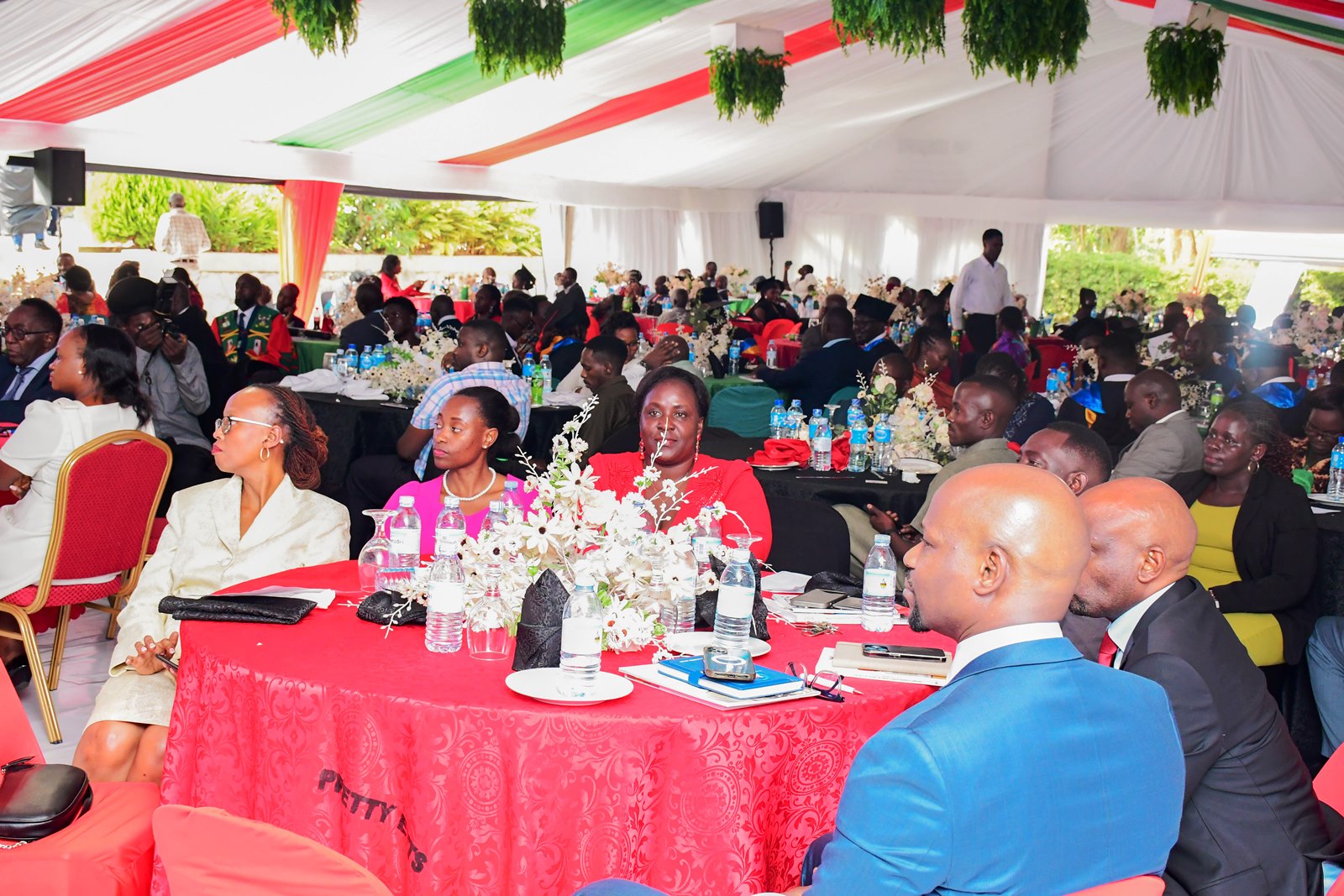
The award ceremony brought onboard invited guests from public and private sectors, the business community, Makerere University officials, faculty members, alumni, industry partners and graduating students. The awards were presented during the Makerere University Convocation Graduation Luncheon.
The ceremony provided a platform for celebrating academic excellence, strengthening alumni engagement, and reinforcing collaboration between the University and its professional and industry partners.
2026 Research Excellence Awards
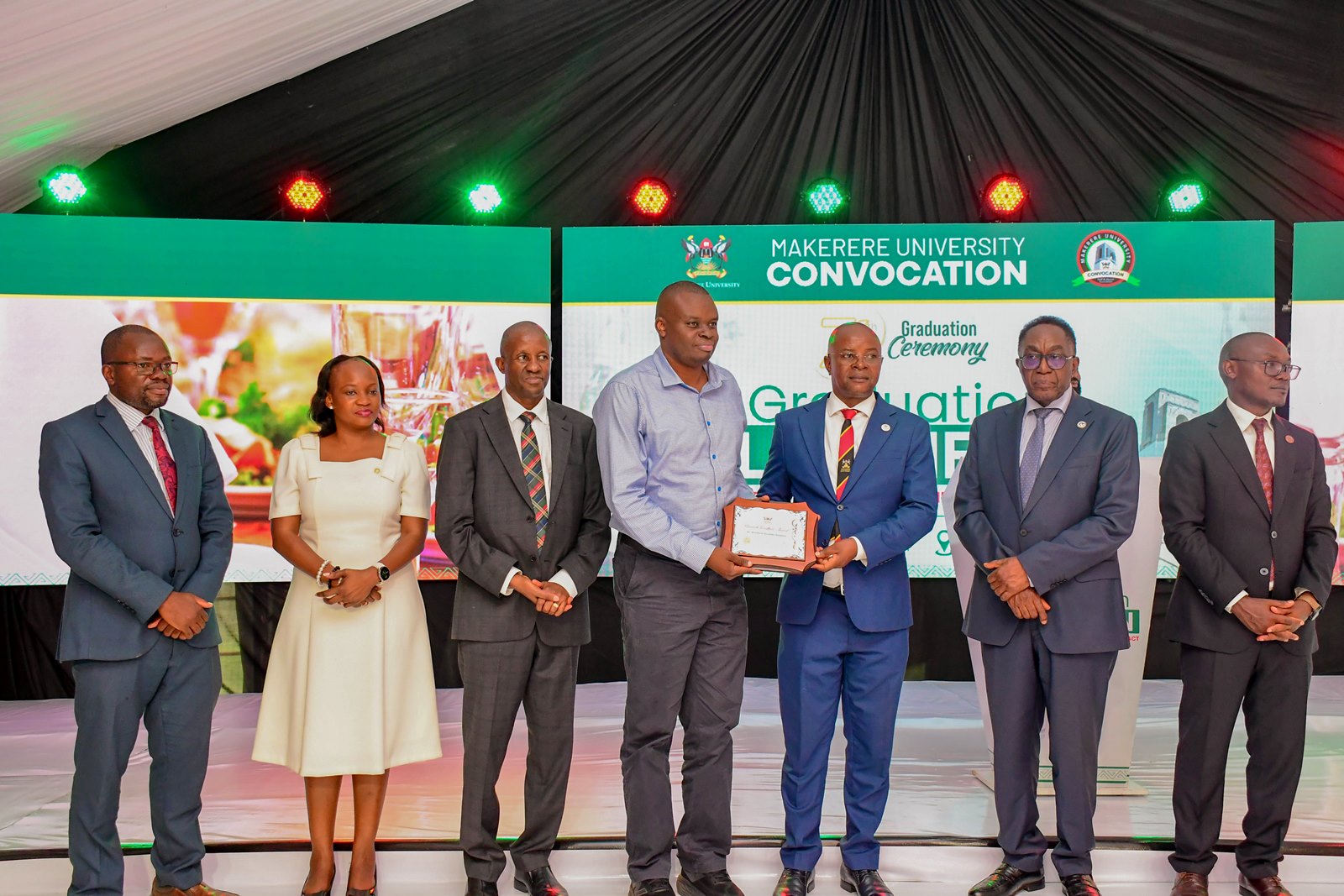
The Vice Chancellor’s Research Excellence Awards were presented to college members whose research output and scholarly contributions have significantly advanced knowledge and strengthened the College’s academic profile.
At CoBAMS, the recipients of the Vice Chancellor’s Research Excellence Awards in the various categories included the following:
- Associate Professor Faisal Buyinza, Overall top research award
- Associate Professor Faisal Buyinza, Senior-Career Research award
- Stephen Ojiambo Wandera, Mid-Career Research award
- Ruth Mpirirwe and Richard Ssempala, Early-Career Research award
The awardees were honored for their exceptional research productivity, impactful publications, and contribution to building a vibrant research culture.
The awards underscore Makerere University’s emphasis on high-quality research that addresses national and global development challenges.
Recognition of Book Author
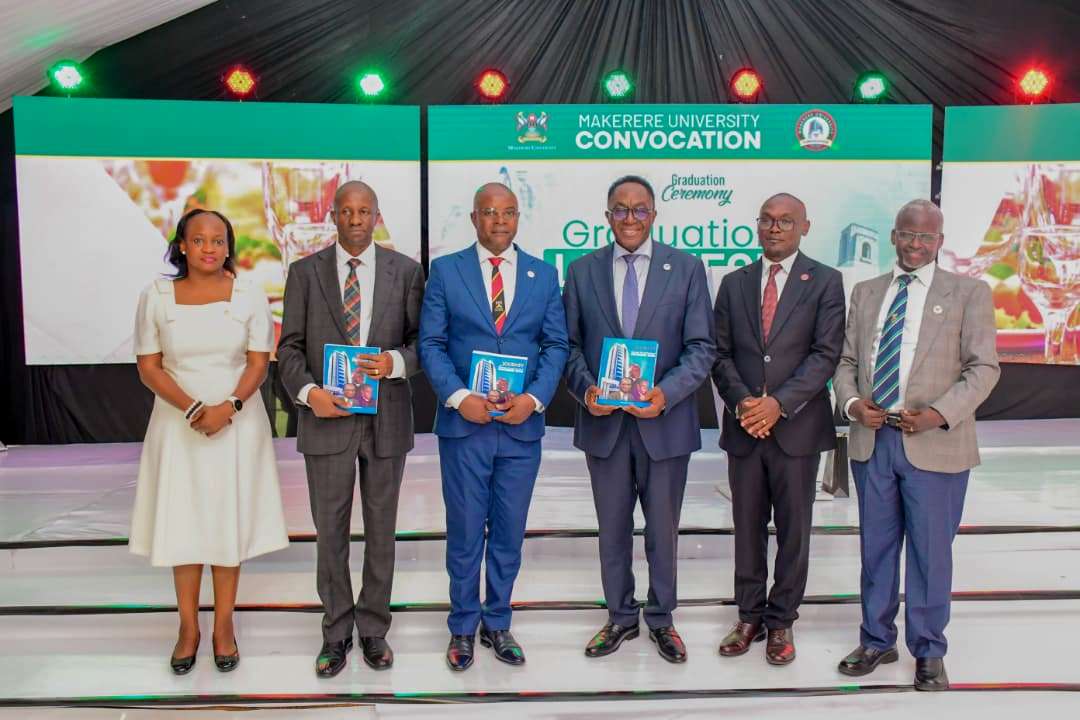
Prof. John Ddumba-Ssentamu, a renowned economist, administrator, former Vice Chancellor of Makerere University, and the pioneer Principal of the College of Business and Management Sciences, was honoured for his contribution to scholarship and knowledge transfer through authorship.
Published by Makerere University Press, Prof. Ddumba-Ssentamu’s book titled, The Journey: Beginnings, Trials and Triumphs of Centenary Bank, highlights the evolution, resilience, and growth of Centenary Bank and reflects his continued contribution to academic literature and thought leadership in the fields of economics and financial development.
Prof. Ddumba-Ssentamu’s recognition reflects the University’s appreciation of distinguished scholars whose published works contribute to intellectual discourse, policy engagement, and the advancement ofscholarship.
Reputable partners recognize excelling graduates
ACCA Uganda- Best Accounting Student
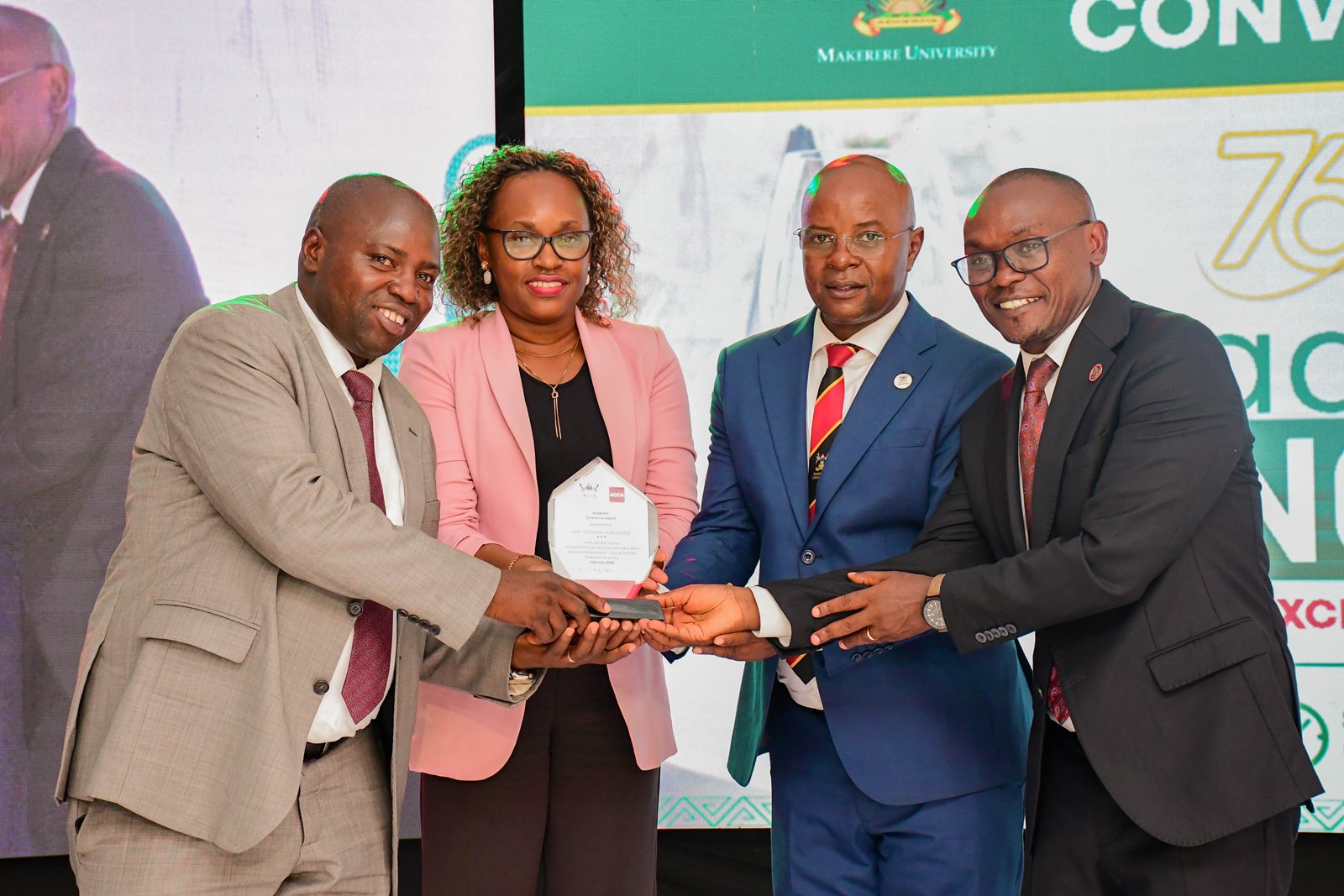
Prudential Uganda-Actuarial Science Award
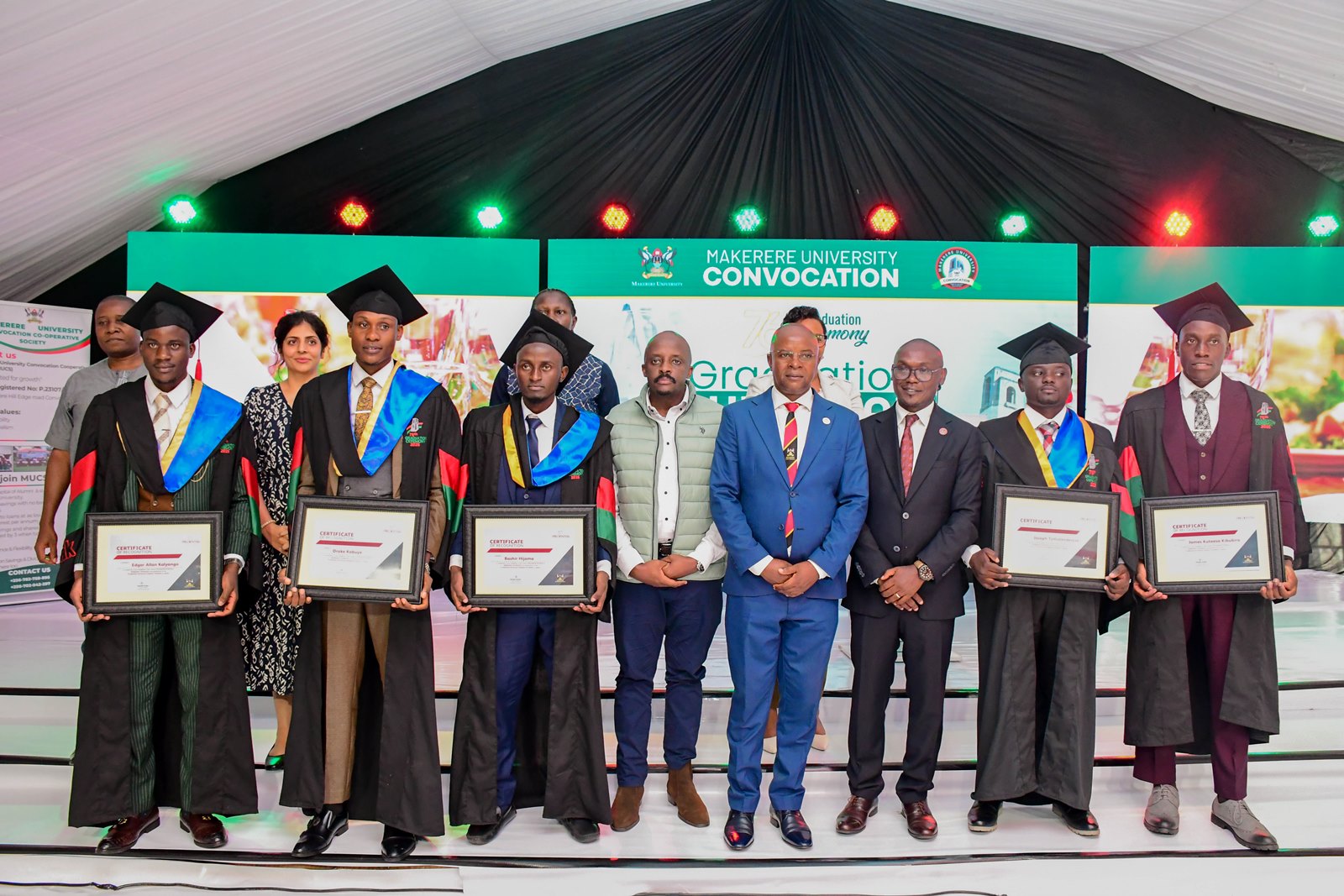
Celebrating academic excellence, Prudential Uganda recognized the fourth cohort of outstanding actuarial science graduates under the Prudential Actuarial Science Support Scheme (PASS). The initiative reflects Prudential’s long-term commitment to building local actuarial expertise and strengthening Uganda’s financial services sector for generations to come.
The top five graduates of Bachelor of Science in Actuarial Science who received the PASS awards included: Drake Kabuye, Edgar Allan Kalyango, Kuteesa Kikubira James, Tumutendereze Joseph, and Bashir Hijoma. These were honored for their outstanding academic performance and commitment to actuarial career. Through PASS, Prudential Uganda provides high-potential graduates with mentorship, internship opportunities, and guidance toward globally recognized actuarial qualifications.
Commenting on the milestone, Tetteh Ayitevie, CEO of Prudential Uganda, said that investing in actuarial talent is critical to building a resilient and sustainable financial services industry. He noted that actuaries play a central role in risk management, pricing, product development, and long-term financial planning, making their contribution vital to the growth of Uganda’s insurance sector.
Prof. Edward Bbaale, the Principal, College of Business and Management Sciences, applauded Prudential Uganda for its ongoing support, highlighting that programmes such as PASS inspire students to excel academically while preparing them for the realities and demands of the actuarial profession.
EPRC Young Professional Award
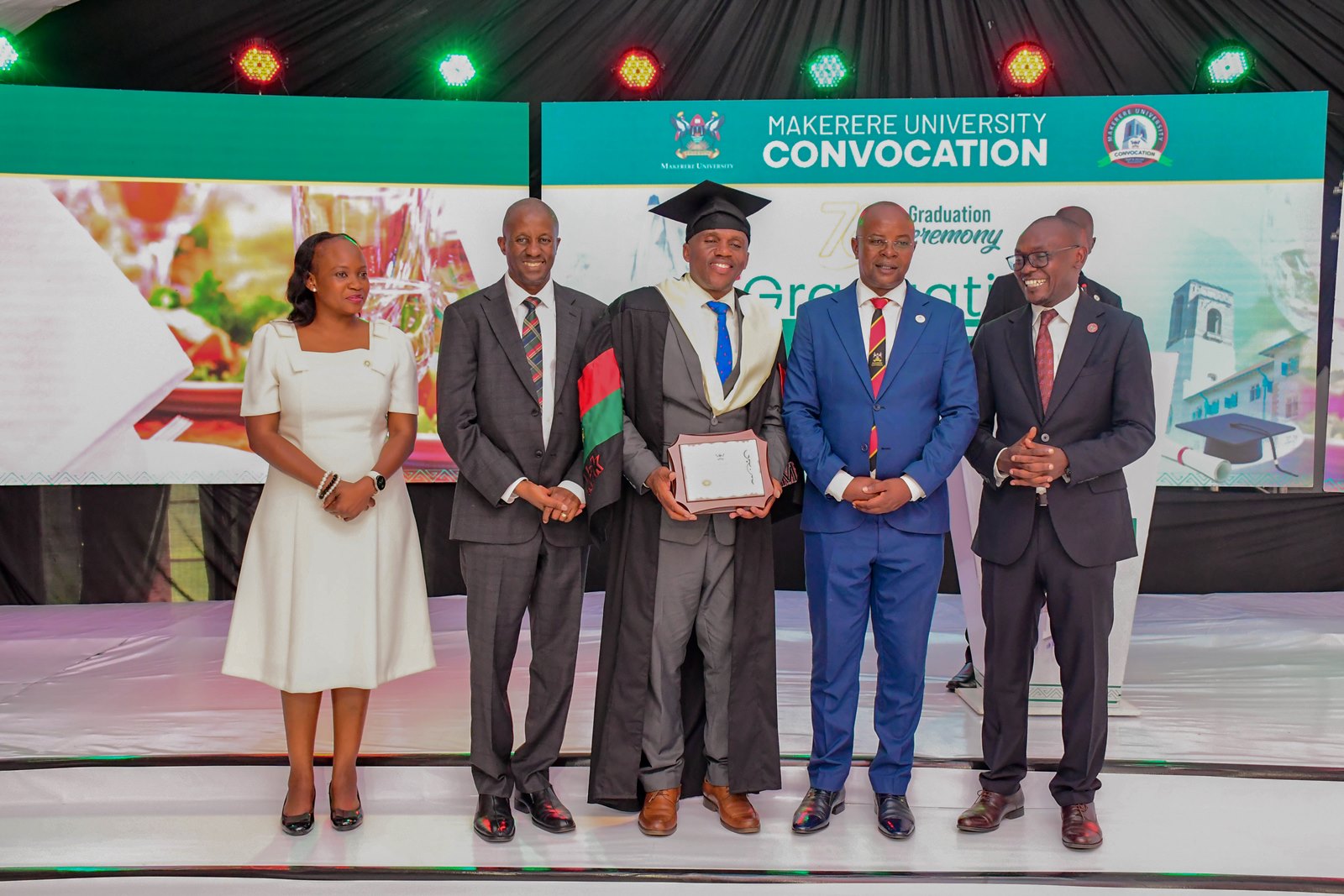
Recognizing excellence, EPRC presented the Young Professional award to Emmanuel Menya, the best Master of Arts in Economics graduate. The award includes a two-year employment contract. Ibrahim Kasirye, the Director of Research at EPRC presented the award on behalf of Dr. Sarah Ssewanyana, the Executive Director.
The EPRC Young Professional Award, recognizes and celebrates exemplary performance. The award underscores the importance of nurturing young professionals who exhibit excellence, innovation, and a strong commitment to national development.
Significance of the Award ceremony
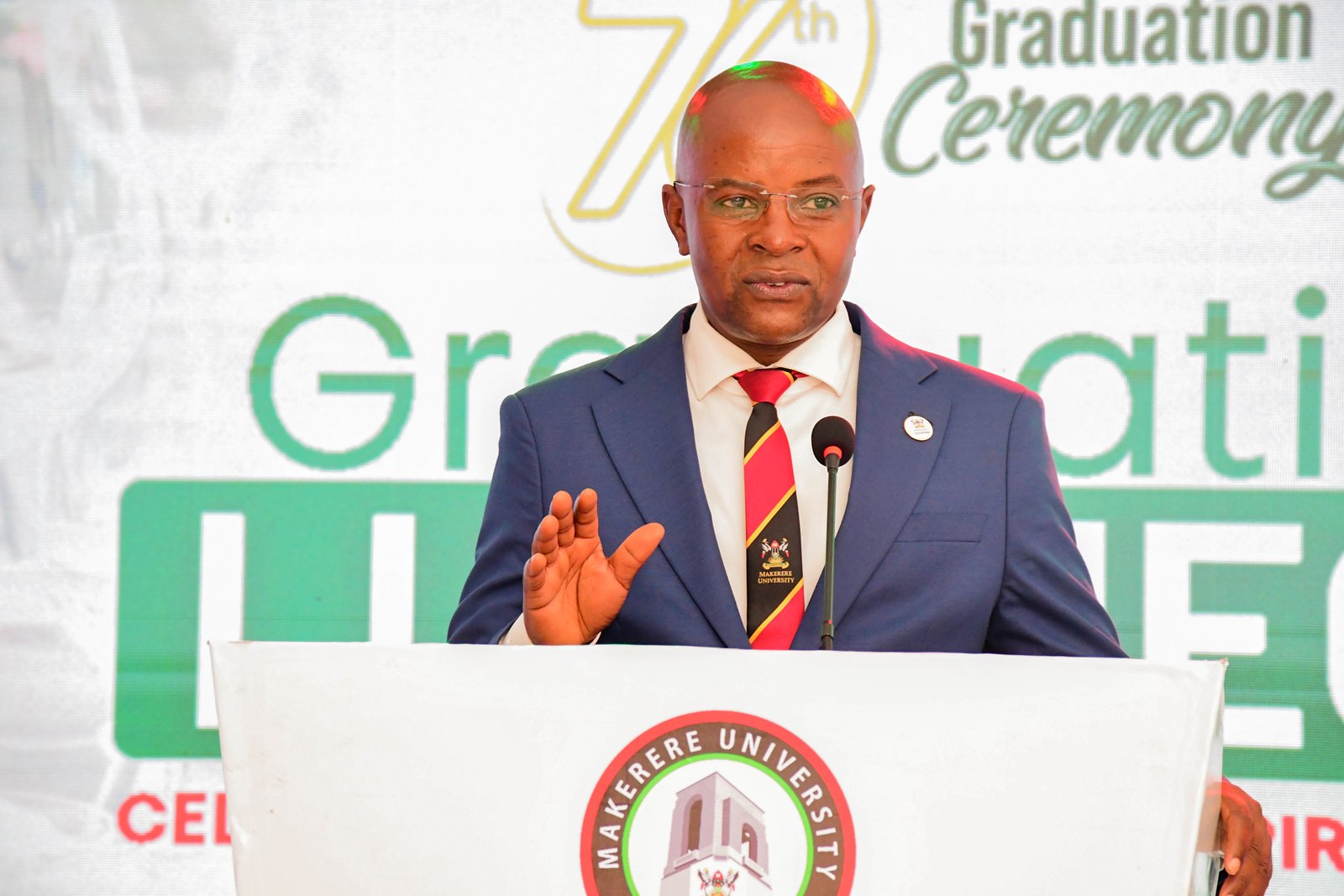
Prof. Edward Bbaale, Principal of College of Business and Management Sciences (CoBAMS), underscored the significance of the ceremony, noting that it served three key purposes: to recognize academic excellence among students, to honor faculty members excelling in teaching, research, and service, and to celebrate Prof. John Ddumba-Ssentamu, former Vice-Chancellor of Makerere University, for his continued contribution to scholarship through authorship.
Prof. Bbaale described Prof. Ddumba-Ssentamu’s ongoing scholarly work as inspirational, stating that it demonstrates a steadfast commitment to knowledge creation beyond leadership roles. He commended both students and staff for their hard work and discipline, emphasizing that university success is a shared achievement.
Collaboration, Responsibility, and Excellence
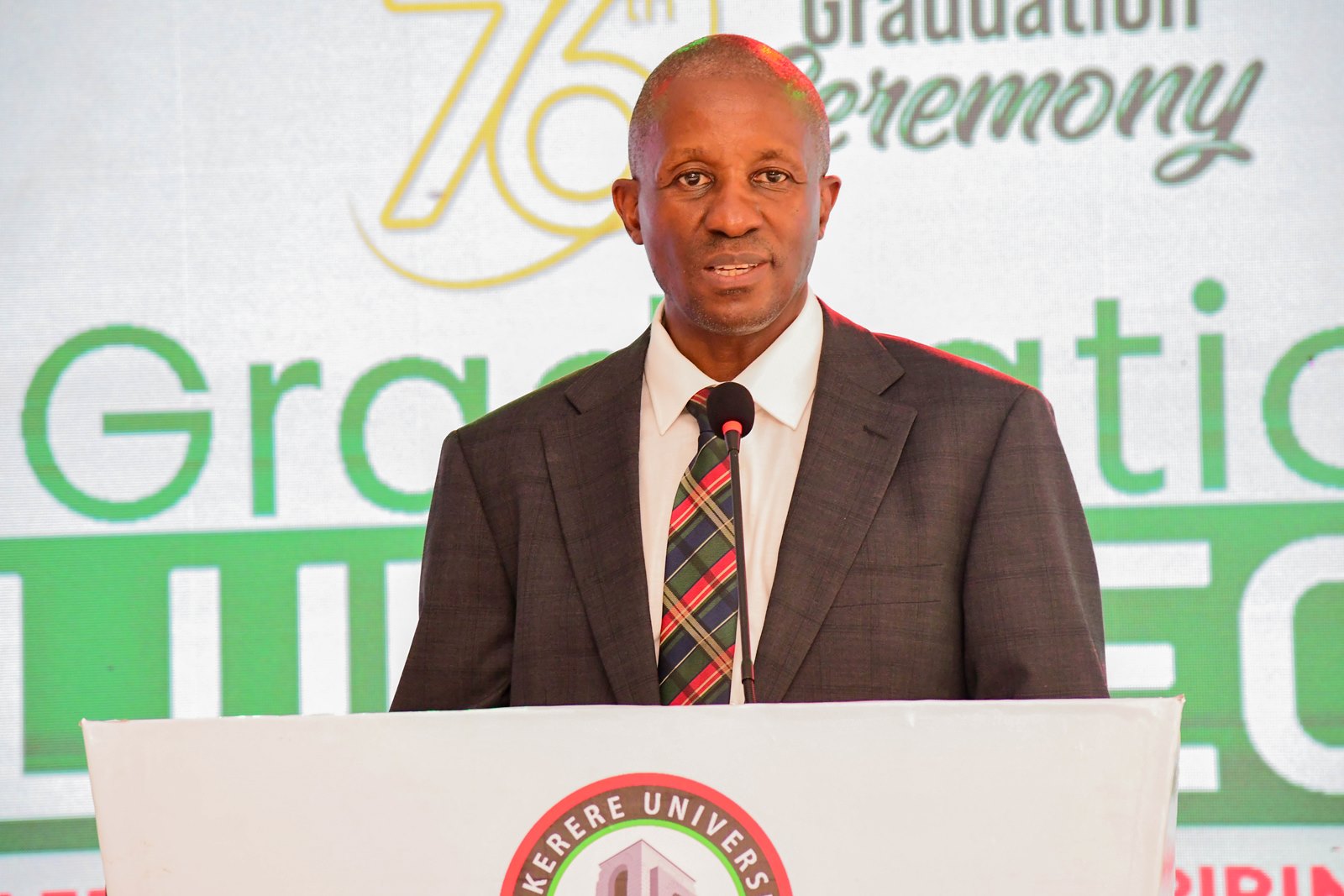
Congratulating the awardees, the Principal of Makerere University Business School (MUBS), Prof. Moses Muhwezi, reminded graduates that being a product of Makerere University is both a privilege and a responsibility.
“Uphold the university’s internationally respected brand, defend it, and take pride in it, while maintaining unity and avoiding internal conflicts that could harm its reputation,” he urged. The Principal of MUBS encouraged graduates to remain committed, diligent, and focused in their pursuit of excellence.
Highlights about Makerere University Convocation
CPA George Mugabi Turyamureeba, Chairperson of the Makerere University Convocation, informed the audience, that the Convocation is a legally established and influential platform for alumni and staff.
Rallying alumni and staff to join Makerere University Convocation, CPA Turyamureeba outlined the achievements and ongoing activities. He reported that during his tenure, the Convocation Executive, had expanded and beautified the permanent home for the Convocation. Some of the ongoing activities include: strengthening alumni engagement, introduction of a cross-generational mentorship program, and the formation of a cooperative society (SACCO) aimed at providing affordable loans and potentially establishing a bank.
He tipped the fresh graduates on resilience, continuous self-improvement, and lifelong learning, stressing the importance of staying connected to their alma mater and the Makerere University Convocation community.
He cautioned the graduates on emerging fraud risks, including digital scams, and fraudulent job offers. He urged them to safeguard their personal information, uphold integrity, and avoid becoming either victims or perpetrators of fraud.
Trending
-

 General12 hours ago
General12 hours agoCall for Applications: Diploma Holders under Government Sponsorship 2026/2027
-

 General12 hours ago
General12 hours agoAdvert: Admissions for Diploma/Degree Holders under Private Sponsorship 2026/27
-

 Humanities & Social Sciences1 week ago
Humanities & Social Sciences1 week agoMeet Najjuka Whitney, The Girl Who Missed Law and Found Her Voice
-

 General1 week ago
General1 week ago76th Graduation Highlights
-

 Agriculture & Environment2 weeks ago
Agriculture & Environment2 weeks agoUganda Martyrs Namugongo Students Turn Organic Waste into Soap in an Innovative School Project on Sustainable Waste Management
